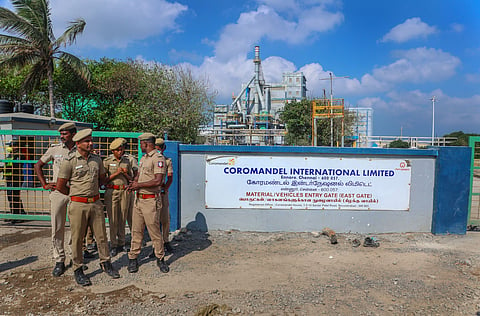

CHENNAI: Tamil Nadu Pollution Control Board (TNPCB) has granted permission to Coromandel International Limited (CIL) for resuming operations of its phosphoric and sulphuric acid plants located in Ennore.
However, the board has not permitted the organisation to open its ammonia storage facility, without obtaining a no-objection certificate (NOC) from the Directorate of Industrial Safety and Health (DISH) and subjected to approvals from the Tamil Nadu Maritime Board (TNMB) and Indian Register of Shipping, said TNPCB chairperson M Jayanthi.
The company has announced in its disclosure to the stock markets under Regulation 30 of the SEBI (Listing, Obligations and Requirements) Regulations, 2015, that the TNPCB had granted said permission in a letter dated August 12. The company, however, did not announce when the allied units would commence operations.
The CIL shut operations of its ammonium phosphate and potassium sulphate plants and other allied units in Ennore, after ammonia leaked from its pipelines on the seabed on December 26, 2023.
Earlier, the National Green Tribunal (NGT) permitted the reopening of the plant on the condition that the CIL must adhere to the guidelines of the TNPCB and a technical committee the latter had constituted. Prior to the NGT’s decision, the TNPCB submitted a report to the NGT Southern bench, stating that 67.638 metric tonnes of ammonia had leaked within a span of 15 minutes from the company’s pipelines.
Meanwhile, some members of the Ennore Makkal Paathukappu Kuzhu, which had protested demanding a permanent closure of the plant, expressed their disappointment over the nod to reopen.
M Amudha (42), a resident of Pathrakaliyamman Nagar in Ennore, said the residents have been suffering from health issues for several years. “The reopening of the plant poses a constant threat to our health and the government needs to act swiftly to address it,” she said.
Another resident said the entire area is “heavily polluted” by several chemical industries and that they do not want to put their future generations at a risk.